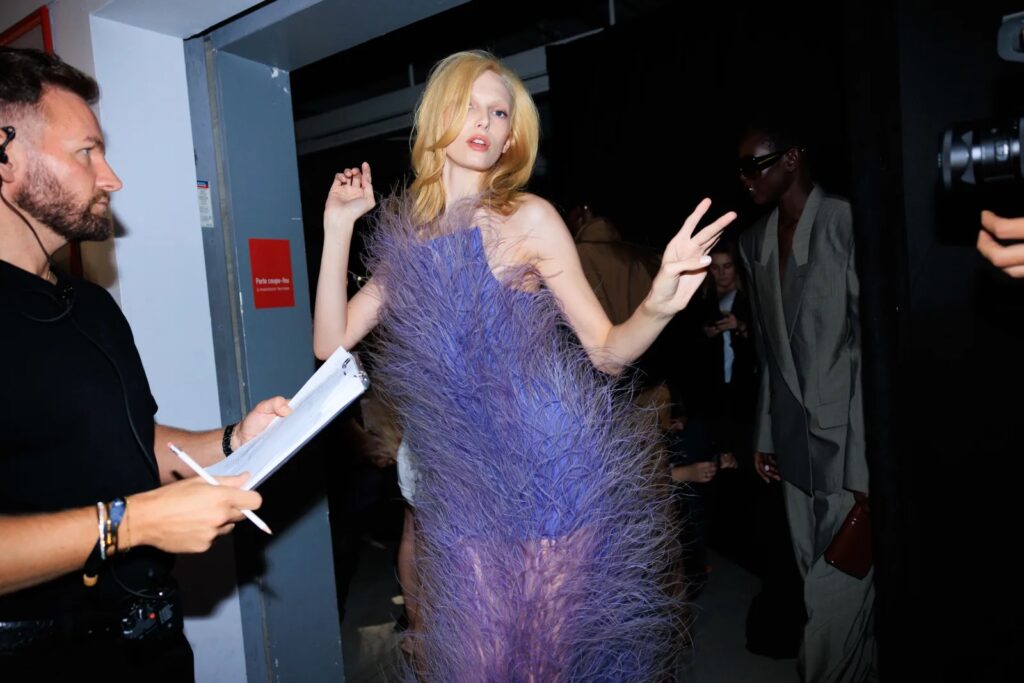
British eco fashion pioneer Stella McCartney debuted a new collection featuring a plant-based alternative to bird feathers at Paris Fashion Week.
The Spring/Summer 2026 runways in Paris introduced the world to a new kind of feather, with Stella McCartney skipping the birds and ditching the plastic for plants.
The British designer, known for her eco-conscious approach to fashion, has partnered with UK startup Fevvers to showcase a new collection featuring the latter’s namesake plant-based feather.
Titled Come Together, the range included three feathered dresses in soft pastels and marked the latest sustainability initiative by McCartney’s label, which turns 25 next year.
“I’ve been having the conversation about not killing cows and goats and snakes or any living animal to be made into a shoe or handbag in my industry for over 30 years,” she told AFP. “But I realised not that long ago that feathers were a whole other barbaric part of the industry.”
The problem with feathers

Feathers have been considered a high-society status symbol since the 19th century in the West, and are today widely used in the fashion industry, primarily for down jackets.
Derived from birds like ostriches, peacocks, chickens, turkeys, and ducks, feathers are a highly unethical material derided by anti-cruelty campaigners. According to Stella McCartney, 3.4 billion ducks and geese are harmed or killed for down feathers every year, and over a million ostriches are slaughtered every year, too.
World Animal Protection reports that ostriches are factory-farmed in confined spaces and electrically stunned before being left to bleed out. It calls these practices unnecessary, noting that 72% of people say they wouldn’t buy clothes derived from wild animals, and 65% say killing them for fashion is unacceptable.
Moreover, peacock factory farms hold as many as 10,000 birds in crowded conditions, where sickness and injuries are common. And marabou feathers, a widely used source for down filling, don’t come from marabou storks; rather, they originate from turkeys and chickens that are confined in cages in the meat industry.
A PETA investigation found that down feathers are also sometimes plucked forcefully while birds being raised for food are still alive. This often causes the animals to be frightened and leaves them with bloody wounds.
The issue with faux feathers, though, is that they’re made from plastics like polyester, which are derived from petroleum and present a whole other set of problems: they are damaging to the environment and to human and wildlife health. These materials take between 20 and 500 years to break down and decompose, shedding toxic microplastics that can enter waterways – thus destroying aquatic life, and our food system.
Can Stella McCartney’s innovation speed up feather bans?

This is what makes Stella McCartney’s plant-based feather collection such a trailblazer. The designer teamed up with Fevvers and Indian textile house Chanakya International for the innovations in Paris.
Fevvers was founded by textile artist Nicola Woollon and creative industry strategist James West, and is currently working on stabilising the material for commercial durability.
“They are vegan, plant-based and natural. Because of that, each feather has a uniqueness, like a fingerprint. It hasn’t come out of a uniform manufacturing line. That natural irregularity gives it beauty,” West told Vogue.
“Other imitations create the idea of a feather, but not the reality,” he added. “This material passes the second-glance test – you look at it and assume it’s real. That’s the distinction.”
Speaking to AFP, McCartney explained: “We grew blades of grass and naturally dyed them and then hand-stitched them onto incredible silhouettes. You get the same effect (as feathers), and you’re not killing billions of birds.”
Calls to eliminate feathers from the fashion industry have been growing louder. Last year, PETA invaded London Fashion Week in protest of the cruelty associated with the material. Stella McCartney signed the animal rights charity’s Feather-Free Pledge, too.
The four major fashion weeks—Paris, London, New York and Milan—still haven’t banned feathers, though their counterparts in Copenhagen, Stockholm, Helsinki and Melbourne have taken that step. Can Stella McCartney’s Fevvers debut usher in wider change?
This isn’t the British designer’s first foray into ethical and sustainable feathers. A lifelong vegetarian, she has previously used Ponda’s BioPuff, a bulrush-based alternative to goose down and polyester fibres, to create a tote bag called Falabella.
She told AFP that Fevvers would likely need financial backing and bans on animal feather to truly take off: “It’s really interesting that this technique can’t get put into production, and yet murdering loads of birds in a building somewhere is in production.”
The post Stella McCartney Takes on Feather Industry with Plant-Based ‘Fevvers’ appeared first on Green Queen.
This post was originally published on Green Queen.